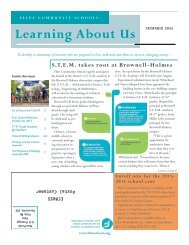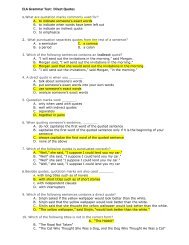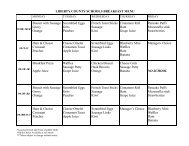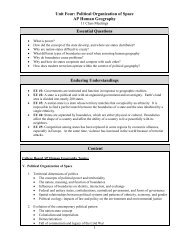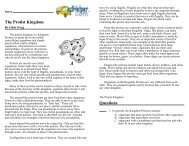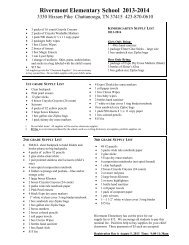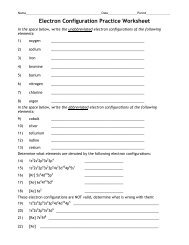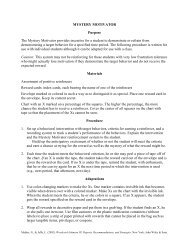The First Civilizations - Baby's First Year
The First Civilizations - Baby's First Year
The First Civilizations - Baby's First Year
You also want an ePaper? Increase the reach of your titles
YUMPU automatically turns print PDFs into web optimized ePapers that Google loves.
Copyright © by <strong>The</strong> McGraw-Hill Companies, Inc.<br />
Name Date Class<br />
PRIMARY SOURCE READING 1<br />
<strong>The</strong> Code<br />
About the Selection<br />
Hammurabi ruled as king of Babylon<br />
from 1792 B.C. to 1750 B.C. He changed<br />
Babylon from a small city-state into a<br />
very powerful state. He established<br />
strong laws. His Code contained<br />
282 laws—a few of which are listed<br />
below—covering all aspects of society.<br />
<strong>The</strong>se laws reflect the social structure<br />
and values of Babylon during<br />
Hammurabi’s rule.<br />
<strong>The</strong> Code of Hammurabi<br />
When Marduk sent me to rule over men, to give the protection of<br />
right to the land, I did right and righteousness in . ..,and brought about<br />
the well-being of the oppressed.<br />
CODE OF LAWS<br />
Reader’s Dictionary<br />
Marduk: the main God of Babylon<br />
oppressed: held down or abused<br />
ensnare: to take or catch<br />
accusation: the charge of a crime<br />
or wrongdoing<br />
1. If any one ensnare another, putting a ban upon him, but he can not<br />
prove it, then he that ensnared him shall be put to death.<br />
2. If any one bring an accusation against a man, and the accused go to<br />
the river and leap into the river, if he sink in the river his accuser shall<br />
take possession of his house. But if the river prove that the accused is<br />
not guilty, and he escape unhurt, then he who had brought the accusation<br />
shall be put to death, while he who leaped into the river shall<br />
take possession of the house that had belonged to his accuser.<br />
3. If any one bring an accusation of any crime before the elders, and<br />
does not prove what he has charged, he shall, if it be a capital offense<br />
charged, be put to death. . . .<br />
6. If any one steal the property of a temple or of the court, he shall be<br />
put to death, and also the one who receives the stolen thing from<br />
him shall be put to death.<br />
7. If any one buy from the son or the slave of another man, without<br />
witnesses or a contract, silver or gold, a male or female slave, an ox<br />
or a sheep, [a donkey] or anything, or if he take it in charge, he is<br />
considered a thief and shall be put to death.<br />
Source: <strong>The</strong> Code of Hammurabi. Tr. L. W.King. www.yale.edu/lawweb/avalon/medieval/hamcode.htm<br />
23<br />
CHAPTER 1



